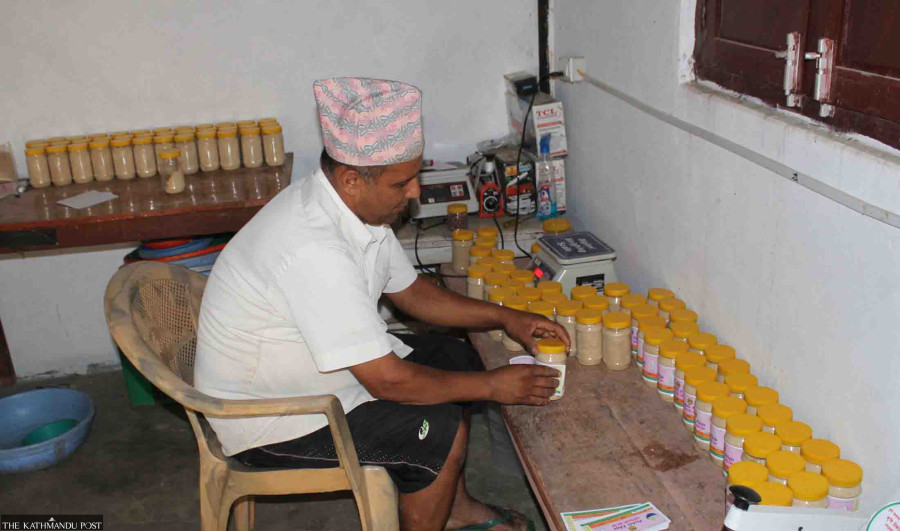Money
Multigrain sattu flour finds export market
Schools are being urged to serve sattu under the mid-day meal programme amid junk food invasion.
Agandhar Tiwari
A traditional multigrain flour is finding an export market for its high protein while foreign junk food is invading Nepal's villages, say traders.
Last year, entrepreneur Thaneshwor Bhusal exported 1 tonne of sattu flour which is made from powdered gram, pulses and cereals. A buoyant Bhusal plans to make 5 tonnes of sattu this year and export most of it.
Nepali sattu is sold in Japan, the United States, the United Kingdom, Australia and South Korea, Bhusal says, but instant noodles have displaced this nutrition-rich food in the hinterlands.
In remote villages, store shelves are packed with instant noodles because they are easy to cook, and can also be eaten directly from the package.
Villagers say demand for noodles has exploded because they are more convenient compared to sattu. Even the government's mid-day meal programme in schools has been providing packaged food to the students.
Krishna Acharya, chief of education of Phalebas Municipality, says the government has been urging schools in the district to serve sattu under the mid-day meal programme.
The community school mid-day meal programme is being run in 42 out of the 77 districts in the country to improve access to education as well as student's health and nutrition by offering nutritious food.
Malnutrition has been rising throughout the country of late. Experts say that malnutrition is not only a result of not getting enough to eat, but also lack of nutritious food, lack of knowledge about using locally available food, and growing junk food consumption among children.
Experts say that it is ironic that demand for sattu has been increasing abroad but falling locally.
“Most of the orders for sattu comes from supermarkets operated by Nepalis in foreign countries,” said Bhusal. "Sattu’s high-protein credentials can be leveraged to popularise it among increasingly health-conscious consumers, but you need proper marketing."
Sattu is also used by packaged food and drink manufacturers, but in small quantities.
There are several cottage companies in the district that produce sattu by processing corn, soybean and wheat. They export the flour to Europe and the US.
A community-operated food processing company in Mudikuwa, Phalebas Municipality-4 has also been exporting sattu flour.
Sattu is sold in food stores and department stores in Kushma Bazaar. Sattu is quality tested before being shipped to market and has a six-month expiry date.
Bhusal, who was exporting pickles and candy made from hog plum, and ginger, started producing sattu after getting more orders. He sells sattu under the brand name Poshilo Sattu, which means nutritious sattu.
Bhusal expanded his business and started producing sattu with a Rs760,000 financial aid from the government of Gandaki province. He started production in 2018. Now he wants to position sattu as an alternative to junk food.
Bhusal started exporting his product to the international market three years ago. For two years before that, he was sending it to different food shops in the district. His company Parbat Food Processing has been operating in Mudikuwa for 22 years.
According to him, some volunteers from the US and Europe have been coming to his factory to learn to make pickles and sattu.
This year, three foreigners learned the process. Students from Germany, Canada, China, the US and India are frequent visitors who come to learn, said Bhusal.
“The price of sattu in Nepal and the rest of the world is the same,” Bhusal said. “I have kept the same price to market the product.”
Sattu costs Rs400 per kg. Bhusal says people in his village are not interested in eating it.
“Initially, locals laughed after I started producing sattu for commercial purposes because it was available in almost all homes in the village,” he said. “But now the market has been expanding locally and internationally. Even villagers come to buy it.”
With the rise in demand, farmers are also happy because they are getting a fair price for their crops like maize, wheat and soybean.
“The price of maize in the village is higher than the market rate,” said Chandrakala Bhusal of Phalebas-6. “Following the establishment of the sattu flour factory in Mudikuwa, we have been selling maize by grading it."
According to farmers, their maize crop which did not fetch even Rs32 per kg now sells for Rs65 per kg,
Bhusal says he buys chickpeas, cashew nuts, peanuts and grains used to make sattu from other districts.
Health workers say that sattu is made from organic nutritious grains produced in the village which is beneficial to people, especially children and the elderly.
“Sattu flour may not appeal to people who have a liking for junk food,” said Rudra Sapkota, chief of the Health Department in Phalebas. “But it has many health benefits.”
The flour helps to deal with health problems like gastric, indigestion and other stomach-related issues. “It is good in terms of nutrition,” he said.




 11.73°C Kathmandu
11.73°C Kathmandu.jpg)













